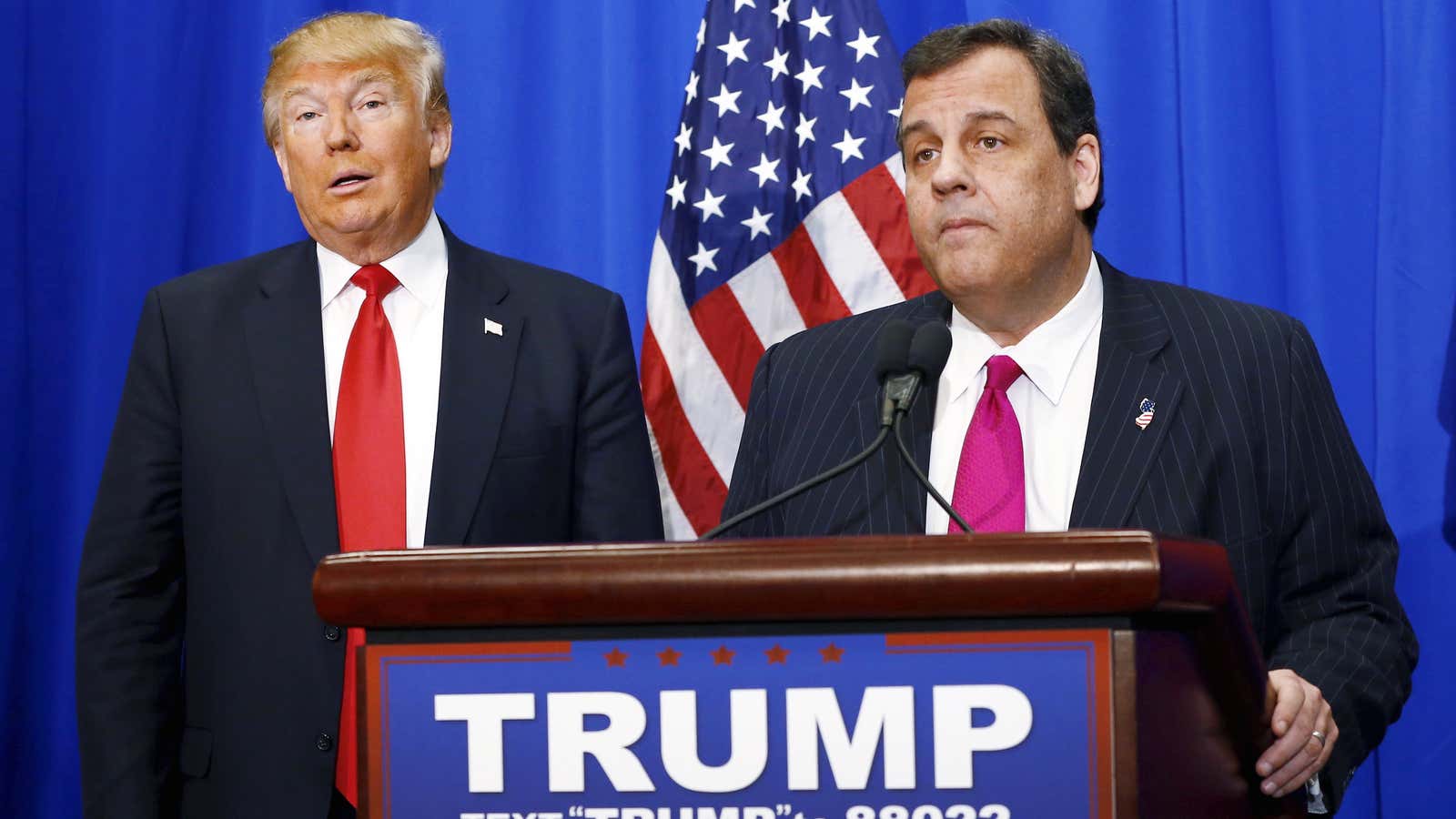In The Big Chill (1983), Jeff Goldblum’s character said that rationalizations are more important than sex: “Ever gone a week without a rationalization?”
With many more primaries left in this presidential election cycle, top Republicans may have plenty of rationalizations in their future. So far, prevailing sentiment among the GOP leadership has been that Donald Trump is a fraud, bully, demagogue, and nativist. But as he draws ever closer to the party’s presidential nomination, we may start to see more and more conservatives start to cave, à la Chris Christie and Ben Carson.
The seductive thing about rationalizations is the way they invariably lead down a path of falsehood by starting with a scrap of truth. Chain smokers sometimes survive into old age, and for someone with a two-pack-a-day habit, such anecdotes offer a handy way to dismiss the conclusive evidence that smoking causes lung cancer and heart disease.
Trump endorsers will no doubt embrace their own equivalents of the elderly chain smoker. Here are a few:
Nobody’s perfect.
Okay, they could say, Trump might lie, but that doesn’t make him any different from other candidates. While it’s true that we’ve witnessed more than a few whoppers this year, Trump is different in that he lies on such a vast scale and with such a brazen indifference to evidence. By the beginning of March, the PolitiFact site had appraised 103 Trump statements, finding 81 to be “false,” “mostly false,” or “pants on fire” (the designation for the worst of the worst). No other candidate comes close. Among many other things, he has denied calling for a 45% tariff on Chinese goods despite a New York Times audio recording of him saying so. He has repeatedly claimed to be self-funding his campaign, even he has taken millions in contributions and his homepage has a “donate” button.
The media are biased.
Trumpistas have long waved away criticisms of their man by blaming liberal media bias. Yes, top journalists have acknowledged that much of the mainstream media leans to the left, but in the age of the internet, news consumers have ample opportunity to shop around for alternative sources. In Nov. 2015, Trump denied mocking a disabled reporter and claimed that had never met him. This denial is easy to disprove with video of his mockery, among other evidence. Some die-hard Trump supporters might still claim that these images are faked, but they’re the types who think that president Obama was born in Kenya even though his birth announcement appeared in a Honolulu newspaper. Is it any surprise that the most prominent birther is none other than Trump himself?
He’ll change.
Some endorsers may candidly acknowledge Trump’s faults while clinging to the belief that he will grow in office and become a better man. “You can coach Donald,” longtime GOP consultant Charles Black told The New York Times. “If he got nominated, he’d be scared to death. That’s the point he would call people in the party and say, ‘I just want to talk to you.’” Sure, there are some cases of adults undergoing radical transformation: on the road to Damascus, the biblical St. Paul changed from being a persecutor of Christianity to its champion. (Of course, that switch involved divine intervention.) One cannot entirely rule out a Damascus moment for Trump, but it seems unlikely. Trump turns 70 years old in June, and he would be the oldest man ever to take the presidential oath for the first time. People that age tend not to change very much. And why on earth would he abandon the bluster and bombast for which the voters have just rewarded him? As for learning on the job, Henry Kissinger wrote that high office “consumes intellectual capital; it does not create it. Most high officials leave office with the perceptions and insights with which they entered.”
The system will keep him in check.
Late boarders on the Trump train may try to console themselves by arguing that the Constitution’s checks and balances will keep the dystopian nightmares of Trump critics from becoming reality. The Madisonian system has indeed endured for more than two centuries—but it is not self-executing. In recent years, Congress has been remarkably ineffectual in curbing executive overreach by Republican and Democratic presidents alike. Both presidents Bush and Obama pressed their advantages, especially on foreign policy, and there is little doubt that Trump would press much harder. He might not get all the way to dictatorship, but a bad president can do an awful lot of damage well before that point.
He’s bad, but Hillary Clinton’s worse.
For conservatives, this one may be the most honest. Close, but no cigar. On a variety of issues, such as trade and entitlement reform, his positions are arguably as liberal as Clinton’s. True, Republicans would dislike her Supreme Court appointments, but it is far from clear that Trump’s picks would be any more conservative. He once said that his very pro-choice sister (a federal judge) would be a “phenomenal” justice. He later claimed that he was joking, but he has given little indication that he has given any thought to broad issues of constitutional interpretation. He has talked about judges “signing” bills, which suggests that he has not even read the Constitution.
There is no doubt that Trump endorsers will try to avert their eyes from such concerns. But in the back of their minds, they will know the truth: not one of these rationalizations is rational.
